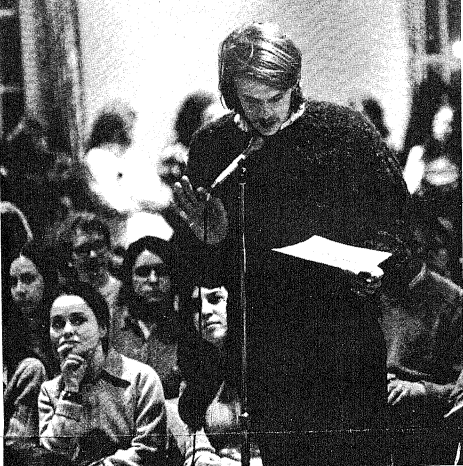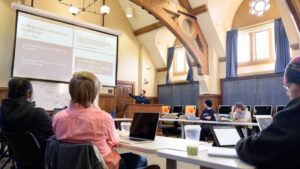April 21, 1972
At an All-College meeting last night, 450 students voted to hold a “noncoercive strike” today to protest the escalation of the War in Vietnam. The resolution was passed “in solidarity” with the National Student Association’s call for student strikes at colleges today.
The group also passed a resolution calling for a “Mobilization Day Against the War” today, to begin actions to bring “an immediate complete and total end to all U.S. involvement in the war.”
A series of eleven workshops and discussions concerning the war have been scheduled for today. The workshops will be led by faculty members and will take place in Mather Hall.
A rally, sponsored by the Hartford Committee of Conscience, will be held at 4:30 at the Federal Building. The rally will be followed by a march to the Army Recruiting Office at the State Armory Building on Capitol Avenue. The march will be led by the Vietnam Veterans Against the War, and some participants dressed in black will carry a coffin.
President Lockwood told the Tripod in an interview yesterday that he would “endorse the use of nonviolent and constructive means to express” student protest against the War. He added that he supported a letter signed by the presidents of eight Ivy League colleges that condemned the renewed bombing of North Vietnam and “its civilian population.”
Lockwood and Cambell, president of Wesleyan University, will send a letter today to Melvin Laird, secretary of defense, “expressing our great concern with the resumption of the bombing,” according to Lockwood. He said the letter will probably be signed by other Connecticut college presidents.
This letter, he added, will not speak for the institutions, but will express the individual views of the presidents.
One of the resolutions passed at last night’s meeting stated that “each member of the community devote his or her time and energy on Friday and the weeks following to activities in the Hartford area aimed at bringing … an end to the careers of those politicians who refuse to bring an end to the war.”
The resolution stated that today’s activities would be “aimed at achieving those ends.”
A motion calling for a strike and a suspension of classes failed to reach a majority vote. Richard Hess, ’72, argued that the NSA’s call for a strike was “meaningless.” He said he opposed any hints of coercion because students should be free to do whatever they want today.
Several students claimed a strike would “force the opinions of a few on many.” Others suggested that anti-war activities be conducted during students “free time,” and not interrupt classes.
One student said a strike would produce community backlash. “They’ll figure we just want a three-day weekend,” he said.
Other students called upon the group to align itself with national events. “For the last two years, we have been disillusioned. What we need now is nothing more or less , than a show of our disapproval,” Jill Silverman, ’74, stated. “We want to turn the tanks around and have them go home.” She continued, stating it is the national magnitude of the strike, rather than the specific form it takes at Trinity that is politically important.
Theodore Mauch, professor of religion, said the group should use “our imagination and our discipline” in adopting means of protesting the war. He accused the Nixon administration of being “anti-education” because it believes “everything can be solved with a thunderbolt.” Educators, he said, “believe in the value of exploration and careful study.”
Mauch added that today’s strike, because it comes at the end of the term, seemed like searching for quick answers. “Why does it take a crisis like this one to wake us up? We should have been doing this all year,” he stated.
Members of the Young Socialists stated that capitalism was the root of the war, and called for a worker-student alliance on behalf of the National Liberation Front, which they said was engaged in a class struggle.
Samuel Hendel, professor of political science, said students should not prevent classes from being held and should not demand that the College take an institutional stand on the war. He said such a stand would violate academic freedom, and would create “an anti-democratic position.”
Thomas A. Smith, vice-president, stating that he spoke both “personally and institutionally,” said the administration “will not close down the College, and will not tolerate any attempts to stop instructors or students from entering classes.”
The administration will not, Smith continued, take action against striking students or professors. He said the administration has no authority over individual faculty members’ actions, and that student strikers would be responsible only to their instructors.
J. Ronald Spencer, dean for community life, told students to contact their instructors before classes today to arrange a different date for examinations, if they are scheduled.
The TCC, at their regular meeting Wednesday, defeated a motion urging students to attend the All-College meeting, to boycott classes Friday, and to attend seminars and workshops instead.
The motion, presented by Steve Barkan, ’73, was made in conjunction with the NSA’s call for a student strike.





+ There are no comments
Add yours